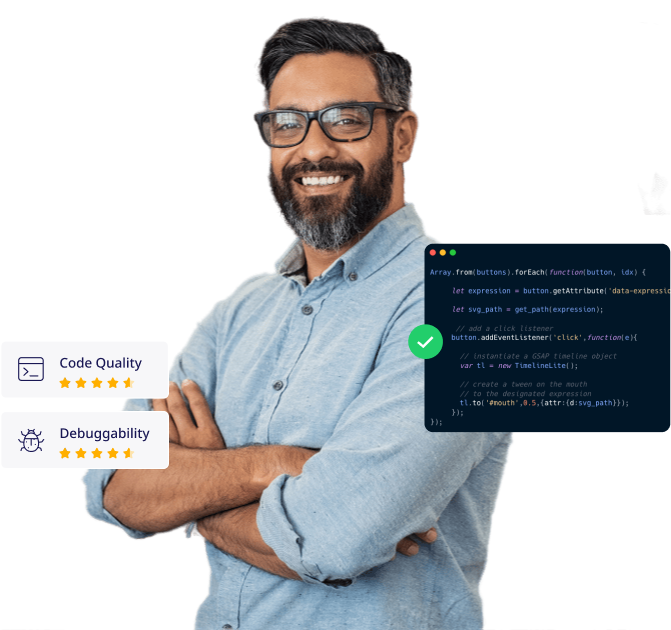Turn data overload into business intelligence. Hire data analytics consultants to discover growth opportunities, improve decision-making, and empower your business with strategic, data-driven solutions.

Partner with ValueCoders' expert consultants to turn your data into actionable insights.
At ValueCoders, we utilize cutting-edge technologies to deliver tailored data analytics solutions that empower businesses. Our expertise spans across various tools and platforms, enabling us to tackle complex data challenges and drive actionable insights.
Trust ValueCoders' consultants to provide accurate and dependable data analysis.
At the core of our development process, we prioritize code quality, implementing stringent testing, detailed reviews, and industry-best practices to deliver software that excels in both functionality and longevity.

Choosing ValueCoders for data analytics consulting means partnering with top-tier experts who deliver actionable insights and drive strategic decisions.
When you hire data analytics consultants, they combine their extensive industry experience, advanced analytical tools, and proven track record to offer tailored solutions that ensure your business stays ahead of the competition.
From startups to big enterprises, development
From startups to big enterprises, development
From startups to big enterprises, development
From startups to big enterprises, development
From startups to big enterprises, development
From startups to big enterprises, development
From startups to big enterprises, development
From startups to big enterprises, development
ValueCoders' experts offer comprehensive solutions for effective data integration.
Hire a team of Data Analytics Consultants from ValueCoders who deliver top-notch web solutions for clients globally.
Hiring the right consultant can transform your business insights into actionable strategies. This guide provides key insights and best practices to help you select the perfect consultant, ensuring data-driven success and innovation for your organization.

Data analytics consultants handle data collection, preparation, advanced analysis, and visualization, providing businesses with clear, impactful insights.
By developing data-driven strategies, ensuring data governance, and continually improving performance, they help organizations enhance operational efficiency, seize growth opportunities, and maintain a competitive edge.
Hiring healthcare data analytics consultants or any other industry-specific experts enables businesses to make informed decisions, utilize advanced analytical tools, and achieve scalable, cost-effective solutions tailored to their specific needs.

When you hire data analytics consultants, it’s essential to look for key skills that ensure they can effectively turn data into actionable insights. Here are the crucial skills to consider:

Evaluating and selecting the right consultant involves several key steps to ensure you find a professional who aligns with your business needs and goals:

Hiring data analytics consultants offers numerous benefits for your business, enhancing your ability to make informed decisions and drive growth. Here are the key advantages:

Effective collaboration with data analytics consultants is key to achieving successful outcomes and maximizing the value of their expertise. Here’s how to ensure a productive partnership:

Data analytics consulting can present various challenges, but understanding these common issues and their solutions can help ensure a successful partnership. Here are some typical challenges and how to address them:
Data Quality and Integrity Issues
Integration of Diverse Data Sources
Misalignment of Objectives
Managing Expectations and Scope Creep
Technical Complexity
Effective Communication
Data Security and Privacy Concerns
Budget Constraints
By proactively addressing these challenges and working collaboratively with your data analytics consultant, you can overcome obstacles and achieve successful, data-driven results for your business.
Find answers to queries that our clients frequently have in mind when hiring data analytics consultants.
Ans. Hiring a data science business analyst from ValueCoders ensures access to top-tier professionals with deep expertise and a track record of delivering actionable insights. Our consultants use advanced tools and techniques to drive data-driven decision-making and improve business outcomes. We offer tailored solutions that align with your specific needs, providing high-quality service and measurable results.
Ans. The cost varies based on factors such as project scope, complexity, and duration. At ValueCoders, we offer competitive pricing tailored to your project’s needs. We provide transparent cost estimates and work within your budget to deliver value-driven solutions. Contact us to request an estimate for your requirements.
Ans. Yes, we encourage you to interview our consultants before making a hiring decision. This allows you to assess their expertise, approach, and compatibility with your project requirements. We aim to ensure you are confident in your choice and comfortable with the consultant’s fit for your needs.
Ans. When you hire data analytics consultants at ValueCoders, our experts prioritize the security and confidentiality of your project by implementing strict data protection measures. We adhere to industry standards and practices to protect sensitive information. Additionally, we ensure that our consultants follow rigorous security protocols to protect your data throughout the engagement.
Ans. Absolutely. We offer flexible hiring options, including short-term engagements. Whether you need support for a specific project or a temporary analysis, our data science business analyst can provide expertise tailored to your short-term needs, delivering results efficiently and effectively.
Ans. Yes, all our consultants are willing to sign a Non-Disclosure Agreement (NDA) to ensure the confidentiality of your sensitive information. We take data privacy seriously and are committed to protecting your intellectual property and project details throughout our collaboration.
We are grateful for our clients’ trust in us, and we take great pride in delivering quality solutions that exceed their expectations. Here is what some of them have to say about us:

Co-founder, Miracle Choice

Executive Director

Director

Director
We offer a 2 weeks risk-free trial for you to try out the resource(s) before onboarding. After 2 weeks, if you like the resource(s), you pay for the time and continue on. Else, we replace the aligned resource(s) or cancel the trial as per your wish.
Simple, transparent and easy - isn't it?
Start my 2 week risk-free trial now!Trusted by Startups and Fortune 500 companies
We can handle projects of all complexities.
Startups to Fortune 500, we have worked with all.
Top 1% industry talent to ensure your digital success.



Let's discuss how we can bring your vision to life.